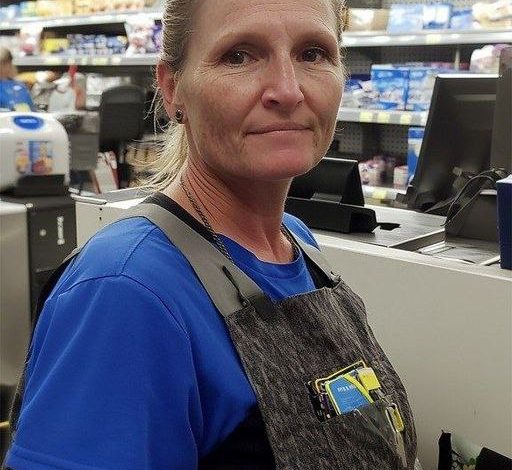
Karma works in mysterious ways, often when we least expect it. These gripping tales show how poetic justice catches up with those who wrong others. Each story reveals how karma delivers its verdict.
Have you ever wondered if karma is real? These four riveting stories eliminate all your doubts. Each tale showcases a dramatic turn of events where karma steps in to balance the scales.
From family reunions marred by arrogance to surprising encounters at a grocery store, these humbling lessons are unforgettable. Follow along as these individuals encounter unexpected paybacks, reminding us all to treat others with respect and kindness.
1. Customer Mocked Me Because I Work as a Cashier at the Grocery Store — Moments Later, Karma Took Revenge for Me
Now, I found myself working as a cashier at a local grocery store, a drastic shift driven by a series of personal and professional upheavals.
The cracks in my life began to show with James, my husband. One evening, as I approached him sitting on the couch, engrossed in what he claimed was work, I sensed a growing distance between us.
“James, are you coming to bed?” I asked one night as he sat on the couch, staring blankly at the TV.
His response was curt: “In a bit. Just need to finish this.”
“Finish what? The TV’s off.”
“Work stuff, Erin. Can we not do this right now?” he snapped, his gaze fixed on the TV.
Despite my growing concerns, I was engulfed in the chaos of managing my work and family life. Then, one fateful night, the truth hit me like a freight train: James had been having an affair. I checked his phone and saw messages from his mistress, Tania, dating back five months.
I confronted him, tears streaming down my face, my heart breaking for our children.
“How could you do this to us?” I cried out, overwhelmed with pain and betrayal.
James, unable to meet my gaze, muttered an apology. “I’m sorry, Erin. I never meant for it to get this far.”
His words were hollow, failing to ease the anguish of our disintegrating family. The stress from the impending divorce compounded the already immense pressure from my job. As I struggled to maintain my focus and productivity, my job’s demands became unbearable.
My manager, Lisa, noticed my declining performance.
“Erin, I need those reports by the end of the day,” she reminded me gently, though her concern was clear. “I know things are tough right now, but we need to stay on track.”
“I’m trying, Lisa,” I replied, my voice trembling. “It’s just… everything is falling apart.”
The emotional and professional strains culminated in a devastating blow when Lisa informed me that my job was no longer manageable.
“Erin, we have to let you go,” she said with regret. “I tried to keep you, but my hands were tied on this one. I’m so sorry.”
The loss of my job felt like the final insult in a series of hardships. The financial strain added to the emotional toll of my divorce, and the job market was unforgiving. Positions matching my qualifications and previous salary were scarce, and I knew I needed to find a job quickly to support my children.
One morning, as I prepared breakfast for Emma, Jack, and Sophie, Emma asked with concern, “Will we be okay?” Her worry mirrored my own fears.
“We will,” I assured her. “I have an interview today, and I promise it will be the right match for us.”
I tried to mask my own anxiety, but Emma’s fears were palpable.
“But I am worried, Mom. I don’t want to live with Dad.”
Her words cut deep. I couldn’t afford to let them down. Desperation led me to accept a cashier position at a local grocery store.
“I know it’s not what you’re used to, Erin,” the store manager, Mr. Adams, said during the interview. “But this job offers stability and a steady income.”
“I understand,” I replied. “It’s just that I have three children to care for.” Mr. Adams acknowledged my situation and offered the possibility of a raise in three months, which provided a glimmer of hope.
Adjusting to the new role was challenging, but it allowed me to be more present in my children’s lives. The regular hours meant I could attend school events, help with homework, and tuck my kids into bed each night.
Sophie expressed her appreciation, saying, “I like this, Mom. You’re not always with your laptop.”
Jack also noticed the positive change, adding, “Mom’s always here now.”
However, life’s trials were far from over. One day, a woman dressed in high-end designer clothes came through my checkout line with her two teenage children.
When she came to the register, I started ringing up her groceries in autopilot mode. I was tired and just wanted the day to be over. I wanted to get home for pizza night with my kids.
As I scanned her groceries, she began to berate me. “What’s with the face, dear? Why aren’t you smiling at your customers?” she asked, tapping her long nails on the counter.
I had been working non-stop and had momentarily forgotten to smile. “I’m sorry,” I said, trying to maintain my composure. “It’s been a long day.”
But her criticism didn’t end there. “Maybe you’re not happy with your job. That’s why you’re miserable.”
Her comment was both hurtful and humiliating, especially since I took pride in my work despite the challenges.
As I finished bagging her groceries, her son accidentally tipped over the cart. The cart’s contents, including expensive wine and gourmet items, spilled onto the floor with a crash, followed by the sound of glass shattering.
The woman’s face flushed with anger and embarrassment. “Michael! Watch what you’re doing! You clumsy idiot!” she shouted. Her reaction only intensified my discomfort, but I quickly began picking up the undamaged items.
“It’s alright, accidents happen,” I said softly, trying to maintain my composure. The other customers watched the scene with a mix of sympathy and curiosity.
Mr. Adams approached the woman, offering assistance. “Ma’am, we can replace the broken items, but you’ll need to pay for them.”
The woman, now visibly flustered, handed me her credit card with a huff. However, the transaction was declined. I tried again, but the result was the same.
“I’m sorry, ma’am, but your card has been declined,” I said, struggling to keep my professional demeanor while feeling a sense of justice.
“That’s impossible,” she insisted. “This must be a mistake. I’ll call someone to sort this out.” She made several calls, but no one answered, heightening her frustration.
As the line of customers behind her grew restless, Mrs. Jenkins, a regular customer, stepped forward.
With a knowing smirk, she commented, “Looks like karma has its own way of working things out. Maybe next time, you’ll think twice before being so rude to others.”
With no means to pay and no one answering her calls, the woman had no choice but to wait in the store. Mr. Adams offered her a chair, but she declined, standing stiffly at the end of my counter. Her children complained about the delay, and the woman’s humiliation was evident.
After over an hour, her husband arrived, dressed in a suit. He immediately turned his frustration on his family, scolding his children and wife.
“How could you be so careless? Do you know how much this is going to cost?” he berated them. “No allowances for you both.”
He then criticized his wife’s handling of the shopping trip, saying, “This is why I told you to leave it up to the cook.”
The entire store watched as he paid for the groceries, grabbed the bags, and stormed out, leaving his family behind.
“You handled that with grace, Erin,” Mr. Adams said as I prepared to leave. “Go home to your kids.”
I was eager to return home, where a pizza party awaited us. Despite the challenges and humiliation, I found solace in the small joys of my new life and the strength I had discovered within myself.
At 38, my life had taken an unexpected turn. I was once a project manager at a mid-sized tech company, balancing a demanding job with raising three children: Emma (15), Jack (9), and Sophie (7).
2. My Brother-in-Law Belittled My Husband for Being a Teacher — Days Later, Karma Brought Him Down to Earth
My name is Sarah, and I’m 37 years old. Every year, my family holds a reunion at my parents’ house, a tradition that brings us all together for a weekend of catching up and reminiscing. This year was no different, except for the usual grand entrance of my brother-in-law, Tom.
Tom is a successful corporate lawyer with a sharp legal mind and a penchant for flaunting his wealth. This time, he arrived fashionably late, driving a flashy red Ferrari that screamed for attention.
As the family gathered in the front yard, Tom pulled up, revving the engine to announce his arrival. Everyone flocked around the car, admiring its sleek design and luxurious appeal.
Tom basked in the admiration, boasting about his latest acquisition. He detailed the car’s top speed, its luxurious interior, and the extravagant price tag with a smug grin. As we sat around the dinner table, the conversation naturally shifted to careers and finances.
David, my husband, began sharing a touching story about one of his students who had overcome significant obstacles to succeed. The warmth and pride in David’s voice were evident, and everyone was captivated by his story.
That is until Tom seized the opportunity to interject. “You’ll never own a car like mine on a teacher’s salary. You should have aimed higher.”
His words cut through the air, turning the atmosphere icy. Everyone around the table fell silent, the joy of the reunion shattered by Tom’s arrogance.
Lisa, Tom’s wife, added, “Honestly, David, why did you settle for such a mediocre job? If you had any ambition, you wouldn’t have to live such an ordinary life.”
David, ever the composed and kind-hearted man, simply smiled and shrugged. “I love what I do,” he replied calmly. “Teaching gives me a sense of purpose that money can’t buy.”
My parents exchanged worried glances, clearly distressed by the harsh words. My mom attempted to change the subject. “So, Tom, how’s work been treating you lately?”
Tom wasn’t done yet. “Oh, it’s been fantastic,” he boasted. “Just closed another big deal last week. The bonus alone could buy two of these Ferraris.”
David tried to steer the conversation back. “You know, one of my students recently got a scholarship —”
Tom interrupted again. “That’s great, but really, David, you could do so much better for yourself. Teaching? Come on.”
Lisa nodded in agreement. “You deserve more than just scraping by, don’t you think, Sarah?”
Inside, I was seething. How could Tom and Lisa belittle David like that? I glanced at David, who met my gaze with a reassuring smile, but I could see the hurt in his eyes.
“David’s work is incredibly important,” I snapped, unable to hold back. “He’s changing lives every day.”
“Sure, Sarah,” Tom said dismissively. “But at what cost?”
I squeezed David’s hand under the table, my mind racing with anger. “You know, Tom,” I said, trying to keep my voice steady, “not everyone measures success by the size of their bank account or the price tag of their car.”
Tom rolled his eyes. “Well, maybe they should.”
My dad tried to diffuse the situation. “Let’s all just enjoy our meal. We’re here to spend time together, not to argue.”
But the damage was done. The rest of the family sat in uncomfortable silence, clearly affected by the tension. As I sat there, fuming, I resolved to bide my time. Tom’s arrogance would catch up with him eventually, and I had faith that karma would find a way to teach him a lesson.
Tom’s day started disastrously when his Ferrari broke down on the way to an important meeting. Stranded and frustrated, he realized he had forgotten his wallet and his phone was nearly dead.
With no other options, he reluctantly made his way to the nearest bus stop. His designer suit and polished shoes looked starkly out of place among the commuters.
As he boarded the crowded bus, he felt a wave of humiliation wash over him. The bus jolted as it pulled away from the stop, and he grabbed a pole to steady himself.
Glancing around, he was horrified to see David, his brother-in-law, seated near the back, reading a book.
David looked up, a calm smile spreading across his face. He waved and motioned for Tom to join him. With no better option, Tom made his way through the packed bus, muttering apologies as he bumped into other passengers. He finally reached David and sat down, clearly uncomfortable.
“So, what brings you here?” David asked, his tone friendly but with a hint of irony.
“My car broke down,” Tom admitted, clearly embarrassed. “It’s in the shop for a few days.”
David nodded, his smile never fading. “Well, this is my daily commute. The bus isn’t so bad once you get used to it.”
As we continued our journey, Tom struggled to maintain his composure. Suddenly, the bus hit a pothole, and Tom lost his grip, tumbling into the lap of a stern-looking elderly woman. She scolded him loudly, causing nearby passengers to laugh. Tom’s face turned beet red.
The bus came to an abrupt halt due to a mechanical issue. The driver announced they would have to wait for another bus. Tom groaned in frustration, stepping off the bus into the rain.
To make matters worse, his phone rang. It was his boss, furious about the missed meeting. Tom’s excuses fell on deaf ears. He had lost an important client in the process, for which he was reprimanded harshly.
When the replacement bus finally arrived, it was even more crowded. Tom found himself squeezed between two large, sweaty passengers. What’s more, the broken air conditioning made the ride unbearably hot.
By the time he reached his destination, his designer suit was soaked with sweat, and his expensive shoes were splattered with mud.
Stepping off the bus, Tom slipped on the wet pavement, landing in a puddle. As he struggled to his feet, David offered him a hand. “Rough day, huh?” David said, barely able to hide his amusement.
Tom looked up, defeated. “You have no idea.”
When Tom finally arrived at work, he was late, disheveled, and humiliated. His boss was waiting for him, unimpressed with his appearance and excuses. He was promptly demoted, losing his prestigious office and being assigned to a cramped cubicle. The day had been a harsh lesson in humility and respect, one that Tom wouldn’t soon forget.
At the next family gathering, the atmosphere was noticeably different. As we all gathered at my parents’ house, I couldn’t help but feel a sense of anticipation.
Tom, usually the first to flaunt his latest achievements and acquisitions, seemed unusually quiet. He arrived on time, without his usual fanfare, and parked his now-repaired Ferrari discreetly down the street.
During dinner, Tom surprised everyone by speaking up in a humble tone. “David,” he began, looking directly at my husband, “I owe you an apology.” The room fell silent, all eyes on him.
David looked up, clearly taken aback. “For what, Tom?”
“For my behavior at the last dinner,” Tom continued. “I was out of line, and I belittled your career in a completely unacceptable way. I’ve realized that success isn’t about material possessions. It’s about making a difference, something you do every day as a teacher.”
David smiled warmly. “Thank you, Tom. That means a lot.”





